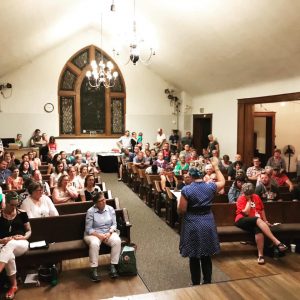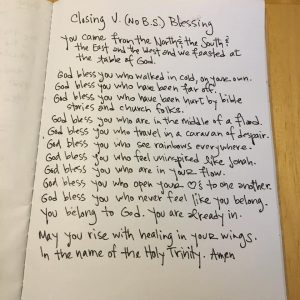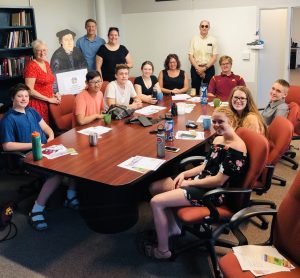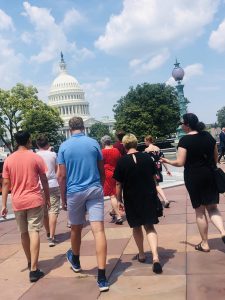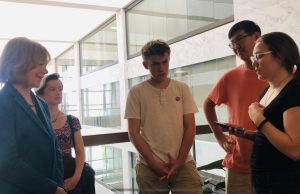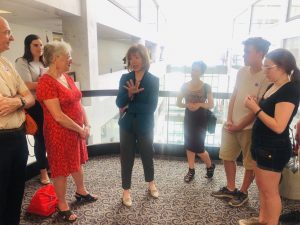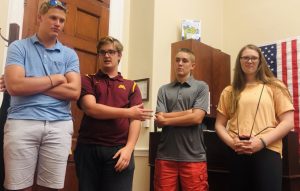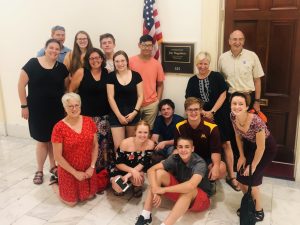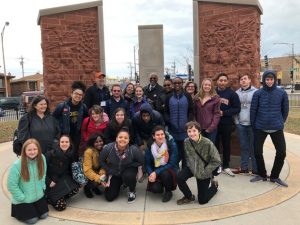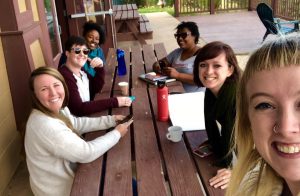United Nations | California | Colorado | Florida | Kansas | Minnesota | New Mexico | Ohio | Pennsylvania | Southeastern Synod | Texas | Washington | Wisconsin
Lutheran Office for World Community, United Nations, New York, N.Y.
Dennis Frado, director
 |
| LOWC Staff, Rev. Fabian Wilches (middle) and Dr Ojot Ojulu (far right). |
HIGH-LEVEL POLITICAL FORUM ON SUSTAINABLE DEVELOPMENT: The seventh session of the UN High-Level Political Forum on sustainable development (HLPF), held under the auspices of the Economic and Social Council, took place in New York City July 9-18 under the theme “Empowering People and Ensuring Inclusiveness and Equality”. The forum reviewed set of sustainable development goals 4 (quality education), 8 (decent work and economic growth), 10 (reduced inequalities), 13 (climate action), 16 (peace, justice and strong institutions) and 17 (partnerships for the goals), with 47 countries presenting their voluntary national reviews on these goals. During the HLPF, the LOWC office welcomed three delegates from the Lutheran World Federation: Ojot Ojulu, assistant general secretary for international affairs and human rights; the Rev. Fabian Wilches, senior advocacy officer; and John Hillary, national coordinator for LWF’s Waking the Giant program in Tanzania. The LWF co-
 |
| LOWC Staff and Dr. John Hillary (far right) |
organized two side events during the HLPF, titled “Taxation & Reparation: Tools for Promoting Equity, Climate Justice and an Economy of Life” and “The Role of Faith Communities in Building Peaceful, Just and Inclusive Societies in Latin America and the Caribbean.” For more information on these events, see below. For more information on the HLPF, click here. A one-and-a half-days session of the HLPF will be held under the auspices of the General Assembly with heads of state and government on September 24-25 in New York City.
TAXATION & REPARATION: TOOLS FOR PROMOTING EQUITY, CLIMATE JUSTICE AND AN ECONOMY OF LIFE: On July 11, during the HLPF the World Council of Churches and the Lutheran World Federation co-hosted an event alongside the World Communion of Reformed Churches, the Council for World Mission and the United Methodist Church, during the High-Level Political Forum. The event, “Taxation & Reparation: Tools for promoting Equity, Climate Justice and an Economy of Life” focused on the need for justice and reparation for exploitation.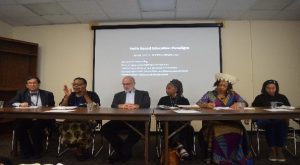
Panelists James Henry, Manuel Montes, and the Rev. Suzanne Matale spoke about the current tax system, urging greater transparency concerning investors and emphasizing the need for people of faith to become more involved because “taxation is no longer a matter for the privileged few.” Montes discussed the history behind the United Kingdom’s tax evasion, the Rev. Matale spoke of her experience in Africa and the unnecessary taxes, including those for digging one’s own bore holes to access clean water, whereas Henry explored the types of tax evasion taking place in the world, including offshore taxation. Raveen Shepherd shared her knowledge of the desperate need for reparation needed in the Caribbean and Iva Karuthas emphasized the need for reparations, calling them a necessary tool for healing rather than a fight for money arguing that there is “not enough money to pay back for the violence, racism, exploitation and cheap labor experienced.”
To conclude the event, the sponsors launched the Zacchaeus Project, part of the “New International Financial and Economic Architecture initiative” (NIFEA), modeled on the transformation of the tax collector, Zacchaeus, in the Gospel of Luke. This campaign’s purpose is to advocate for tax justice, address social & ecological debts, while also educating churches about the issues involved when advocating for tax justice and reparation. For more information, click here.
“ENDING VIOLENCE AGAINST CHILDREN IN THE PACIFIC AND TIMOR-LESTE”: During the HLPF, World Vision, the ChildFund Alliance, Save the Children and Plan International co-hosted an event titled “Australian Coalition of Child-Focused INGOs: Unseen and Unsafe: The Underinvestment in Ending Violence Against Children in the Pacific and Timor-Leste.” This event, held on July 12, emphasized the “normalization” of violence within the home, highlighting that while “1.7 billion people experience some form of violence every year”- childhood trauma, including brain shrinkage in children that have experienced or been exposed to violence, is preventable. The event presented two reports, including in-depth country case studies and an “INSPIRE Framework” with seven strategies for ending violence against children.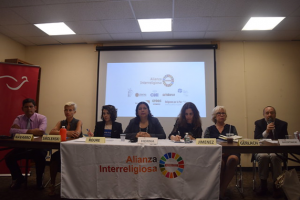
“THE ROLE OF FAITH COMMUNITIES IN BUILDING PEACEFUL, JUST AND INCLUSIVE SOCIETIES IN LATIN AMERICA AND THE CARIBBEAN”: On July 17 the Inter-Religious Alliance for the 2030 Agenda together with such other organizations as Religions for Peace Latin America and the Caribbean, the Action by Churches Together Alliance (ACT Alliance) and the Lutheran World Federation (LWF) co-hosted an event during the HLPF on Sustainable Development concerning “The Role of Faith Communities in Building Peaceful, Just and Inclusive Societies in Latin America and the Caribbean”.
The event opened with remarks by Rabbi Elias Szcztnicki, who emphasized the importance of the Inter-Religious Alliance for the 2030 Agenda as a platform of faith across Latin America and the Caribbean, helping to connect and coordinate religious networks in their advocacy work with governments and others in civil society.
Panelists Juan Carlos Navarro, Secretary General of Cáritas Madre de Dios, in Peru and Karina Gerlach, senior adviser of Pathfinder for Peaceful, Just and Inclusive Societies, shared their experiences in Latin America and the Caribbean and connected their work to the sustainable development goals.
Sarah de Roure, country manager of Christian Aid in Brazil, mentioned the high number of homicides throughout of Latin America and the problem of threats and attacks on journalists and civil activists by the government. Fundamentalist voices are getting louder and she highlighted proposed alternatives as provided by the ACT Alliance or Christian Aid.
Laurie Smolenski, outreach and development officer at the Institute for Economics & Peace (IEP), argued that religious networks play an important role. Because they serve even remote and under-sourced communities, they can promote unity and build linkages between religions and different communities to foster achievement of SDG 16.
Find the event agenda here.
California
Regina Q. Banks, Lutheran Office of Public Policy- California (LOPP-CA) lutheranpublicpolicyca.org
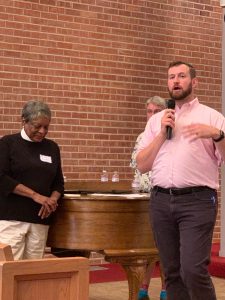 SUMMER RECESS: The Legislature for the state of California is in Summer Recess and slated to return August 12. Fiscal Committees will have roughly 3 weeks, until August 30, to hear and pass the remaining fiscal bills to the floors of the respective houses. The remaining two weeks of session, until September 13, is reserved for floor sessions. This first year of a two-year session adjourns at Midnight on Friday, September 13, 2019.
SUMMER RECESS: The Legislature for the state of California is in Summer Recess and slated to return August 12. Fiscal Committees will have roughly 3 weeks, until August 30, to hear and pass the remaining fiscal bills to the floors of the respective houses. The remaining two weeks of session, until September 13, is reserved for floor sessions. This first year of a two-year session adjourns at Midnight on Friday, September 13, 2019.
SUMMER LEGISLATIVE VISITS: Summer is an excellent time to meet with federal, state and local policy officials while they are back home in their districts. LOPP-CA would like to highlight just such an opportunity taken. Lutheran Church of the Master in Sacramento, CA hosted a beautiful community meeting with elected officials on the Sacramento City Council and command representatives from the Sacramento City Police Department and local social service agencies to address the homelessness issue in their South Land Park community. Pr. Linda Boston and Councilman Steve Hansen did a great job of engaging the nearly 100 participants who came out on a hot Wednesday evening on July 24th. It is a beginning 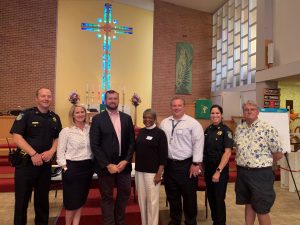 to their local advocacy and LOPP-CA has vowed to walk with them. Is your congregation interested in beginning an advocacy project? Contact us and we would be proud to walk with you.
to their local advocacy and LOPP-CA has vowed to walk with them. Is your congregation interested in beginning an advocacy project? Contact us and we would be proud to walk with you.
HUNGER LEADERS’ GATHERING 2019: LOPP-CA participated with ministries across the country (and touching locations across the globe) in the Hunger Leaders’ Gathering hosted by Central Lutheran Church of Minneapolis, Minnesota July 18-21. The Hunger Leaders’ Gathering is a conference of ELCA World Hunger Grant recipients. ELCA World Hunger Grants amount to LOPP-CA’s single largest funding source and a source of ministry support and guidance. It was a blessing to get together with fellow recipients and World Hunger staff to share best practices and network. Standby for word on new initiatives from California!
MISSION SUPPORT LETTER: Be on the lookout for a letter going to congregations asking for additional mission support. The work we do here at LOPP-CA is dependent upon you and your congregation’s generosity. Please consider blessing our ministry with an additional gift today. Instructions can be found in the mail, or at our website: www.lutheranpublicpolicyca.org
CONGREGATION VISIT THANK YOU’S: A sincere Thank You goes out to congregations that have welcomed LOPP-CA into their Sunday worship experiences recently. They were truly blessed times in the Lord, and we look forward to coming back soon. Specifically, St. Mark’s Lutheran Church (Fairfield) Pr. Karen Stetins Sr. Pastor, Peace Lutheran Church (Grass Valley) Rev. Bill Wong Interim Pastor and Lutheran Church of the Master (Sacramento) Pr. Linda Boston Sr. Pastor.
Colorado
Peter Severson, Lutheran Advocacy Ministry–Colorado lam-co.org
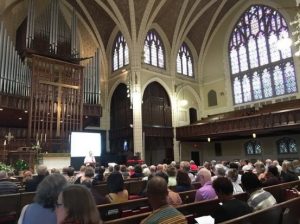 |
| The World Hunger Gathering took place at Central Lutheran Church in downtown Minneapolis |
CONGREGATION VISITS: July, Peter Severson, director of Lutheran Advocacy Ministry-Colorado, was invited to present at Trinity Lutheran Church, Boulder, and First Lutheran Church, Colorado Springs. Thank you for the invitations!
WORLD HUNGER GATHERING: Severson and other hunger leaders from the Rocky Mountain Synod took part in the ELCA World Hunger Leaders Gathering in Minneapolis, in mid-July. The event featured speakers ranging from recipients of Domestic Hunger Grants to partners in ministry from the ELCA churchwide organization, and included various training sessions and educational opportunities. We are grateful for our partnership with ELCA World Hunger, a grant from which sustains LAM-CO’s work in Colorado. The creative and courageous work being done by our faithful hunger leaders is inspiring!
Florida
Russell Meyer , Florida Faith Advocacy Office/Florida Council of Churches (FFAO/FCC) floridachurches.org
EDUCATION ROUNDTABLE: Working with the Real Talk Coalition for Education Equity, FFAO/FCC participated in the roundtable “Grading Education” at the Florida PTA Office, Orlando, on July 31. This gathering of stakeholders and researchers will begin developing a tool for grading the capacity of legislation to close disparity gaps in education.
RISE FOR REFUGEES: With national attention on detention centers, FFAO / FCC will be supporting Rise for Refuge on August 3 around the state. A number of clergy will deliver Spanish Bibles to the Homestead Detention Center on August 25 and 26.
OCEAN CARE: In cooperation with Creation Justice Ministries, FFAO / FCC is co-sponsoring an ocean care deep dive training event at St. Armands Lutheran Church on August 29 for younger clergy to help network climate action. Members of Congress and their staff have also been invited.
STATE CLERGY CONVENING: The FFAO / FCC State Clergy Convening will be at the Florida Hotel and Convention Center in Orlando on September 12 and 13. Major legislative advocacy issues will be presented.
NO-CALL LIST SIGN-ON LETTER: The FCC executive committee sent a letter to State Attorney Brad King, 5th Judicial Circuit, urging him to establish a “no-call list” of police officers who have made racist and violent remarks on social media and therefore would not be called as prosecution witnesses. A broad coalition co-signed the letter. https://floridachurches.org/establish-a-no-call-list-in-lake-county/
Information on all of these events can be obtained by emailing advocacy@floridachurches.org
Kansas
The Kansas Legislature is out of session, but Kansas Interfaith Action keeps working!
MEDICAID EXPANSION: Expansion will be discussed by two interim committees prior to the 2020 session. The members have been named but no hearing dates have been set. Since conservative (anti-expansion) leadership is running the process we expect there to be significant proposals to limit expansion: work requirements, state spending caps, and the like. Our messaging is that expansion is meant to give more people access to health care, and that should be the focus, not figuring out ways to take it away.
CLIMATE AND HEALTH: This week saw the publication of a report from the Kansas Health Institute on likely impacts of climate disruption in Kansas. Called Policy Brief: Health and Climate Change in Kansas, the report states, “climate change is a substantial concern in Kansas” and that “projected climate changes are likely to have negative impacts on human health,” including increasing temperatures and more variable precipitation; hotter, drier conditions affecting air quality; increased rates of cardiovascular diseases, respiratory diseases and other chronic conditions; expanded seasons for allergies; increased length of season for insects and insect-borne illnesses, etc.
CLIMATE AND HEALTH DECLARATION: KIFA is one of the initial signatories of a climate and health declaration being rolled out next week by its long-time partner Climate and Energy Project. We will be sharing this important information with our supporters and partners and developing opportunities to deliver our message: that climate disruption is a pressing concern – not in the future, but today; and care for creation, for human health, and for the poor – who are being affected first and worst by climate change – are obligations for people of faith!
Minnesota
Tammy Walhof, Lutheran Advocacy- Minnesota (LA-MN) lutheranadvocacymn.org
RENEWABLE ENERGY: Does your church have a solar array? (Or do you have one at home?) Send pictures and a short description! Also, send those pictures and description to your state legislators and tell them that Minnesota and the country need to move faster to more clean energy!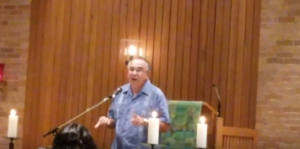
IMMIGRATION: Lutheran Advocacy-MN extensively publicized an immigration program with the Rev. Mateo Chavez of San Juan Bautista Lutheran Church in Tucson, Ariz., presented at Tapestry Lutheran in Richford, Minn. The Gospel reading, Luke 10:25-37, was the Good Samaritan story. Listen (below) as he connects the Bible passage to the situation of immigrants and asylum seekers at the U.S. border. (The Rev. Melissa Melnik Gonzalez of Tapestry does great translation). Mateo, with others from his family, also told stories of people arriving at the Nogales border crossing area. We hope to share some of those stories soon. Many Lutheran Advocacy-Minnesota advocates appreciated the hospitality (including dinner) of the Tapestry congregants. Good Samaritan/immigration sermon video is 15 minutes long and only his message, not the whole worship.
AUGUST RECESS: Visit members of Congress over their August recess and/ or have a letter-writing activity at your church or group. Find a sample letter on our website and call Tammy at 651-238-6506 for talking points to use in visits.
UPDATES AND ACTION ALERTS: LA-MN has been sending three to four action alerts, updates, or event notices per month. Are you getting them? If not, be sure to sign up on our website! (If you’ve signed up and still aren’t getting them, let us know).
New Mexico
Ruth Hoffman, Lutheran Advocacy Ministry—New Mexico (LA-MN) lutheranadvocacynm.org
 |
|
LAM-NM director, Ruth Hoffman (right), joins fellow advocate, Bill Jordan, and former state senators Michael Sanchez and Dede Feldman at the gathering.
|
10TH ANNIVERSARY CELEBRATION OF DEATH PENALTY REPEAL: New Mexico repealed the death penalty on July 1, 2009. Lutheran Advocacy Ministry-New Mexico was an active partner in the New Mexico Coalition to Repeal the Death Penalty, which worked for 12 years to realize its goal. On June 30, the coalition held a gathering in Albuquerque to celebrate the 10th anniversary. Memories of the coalition’s work were shared and two leaders of the coalition who have since passed away were remembered. The legislation’s prime sponsor, Rep. Gail Chasey, was honored as were several other legislators instrumental in the bill’s passage. When the death penalty was repealed in New Mexico, two men remained on death row. A few days prior to the anniversary gathering, the New Mexico Supreme Court vacated their death which permanently shut our state’s death row!
Ohio
OHIO HAS A BUDGET! YOUR ADVOCACY MADE A DIFFERENCE: Seventeen days late, Ohio’s legislative leaders reached an agreement on our state budget that includes more money for the Ohio Housing Trust Fund and Ohio’s food banks. The Legislature also increased funding for wrap around services for students and for other programs. While these increases should be celebrated, we cannot forget that they do not alone solve the problems of poverty, hunger and homelessness in Ohio. After years of tax cuts and underinvestment, we have a long way to go toward adequate investment in solutions.
VOTER REGISTRATION GRANTS: The Hunger Network is offering $200 grants to Ohio hunger ministries if they are willing to help us collect voter registrations before the November 2019 elections. As people of faith, called to love our neighbor, we should seek all of our neighbor’s voices in our democratic process. If you have a food ministry, and would like to receive a mini-grant please fill out the application form here.
Pennsylvania
Tracey DePasquale, Lutheran Advocacy Ministry–Pennsylvania (LAMPa) lutheranadvocacypa.org
CLIMATE AND DISASTER RESPONSE: LAMPa accompanied Lutheran Disaster Response (LDR) coordinators and a Lutheran meteorologist to meet with Sam Robinson, Gov. Wolf’s Deputy chief of staff, about the administration’s Restore Pennsylvania proposal to impose a severance tax on natural gas to back a bond that could, among other things, be used to mitigate flooding and respond to climate-related disasters. Julia Menzo, LDR coordinator for eastern Pennsylvania, and the Rev. Glenn Beard, LDR coordinator for the Lower Susquehanna Synod, shared stories from their work to underscore the growing need related to more frequent disasters not covered by federal aid. Meteorologist Joe Stepansky, Lower Susquehanna Synod Treasurer, and LAMPa Director Tracey DePasquale questioned Robinson about the proposal’s lack of strong measures to transition to renewable energy. Our delegation agreed to keep working to improve the proposal, stressing that we would rather invest in a solution than borrow for a bandage.
HUNGER: After years without an increase in the State Food Purchase Program, DePasquale met with several leaders of the Pennsylvania Hunger Action Coalition to assess our advocacy, share feedback from lawmakers, evaluate our networks and begin to develop a new strategy based on emerging health-related partners and focus on local agriculture. We are laying the groundwork for a potential campaign to revamp the state’s largest anti-hunger program. LAMPa will be looking to our ELCA World Hunger leaders in Pennsylvania to champion this change.
GOD’S WORK. OUR HANDS: LAMPa is resourcing congregations to add advocacy to their day of service on Sept. 8.
Southeastern Synod
Hilton Austin, Southeastern Synod advocacy team
GEORGIA INTERFAITH PUBLIC POLICY CENTER: We continue work on the new Georgia Interfaith Public Policy Center. We are in the process of incorporation and filing for our 501(c)(3) status. We have an impressive interfaith board of directors with contacts throughout the state. We are very excited about this expansion of our base and the opportunity to work together.
CRIMINAL JUSTICE REFORM: Over the past eight years, Georgia has transformed its criminal justice system. Reforms aimed at cutting prison costs while improving public safety, have encouraged other states to enact similar measures and helped prompt the Trump administration to take action on the federal level.
Now the state will serve as a hub, pushing criminal justice issues nationwide with a newly formed nonprofit based in Atlanta. Members hail from across the political landscape. The nonprofit’s advisory board includes such prominent Democrats, as former California Gov. Jerry Brown and ex-Philadelphia Mayor Michael Nutter, and such prominent Republican as, U.S. Senator Mike Lee of Utah and Gov. Matt Bevin of Kentucky.
Former Gov. Nathan Deal and former Acting Attorney General Sally Yates — both Georgians — will also play key roles in the effort.
“It’s the right idea at the right time,” said Adam Gelb, founder and CEO of the Council on Criminal Justice. “There’s a real thirst across the political spectrum and across the country for sound data and research on strategies that work to cut both crime and incarceration… We’re going to be a catalyst for policy that’s factual, not just fashionable.”
SOUTHEASTERN SYNOD HUNGER FELLOW: August will be Jordan Slappey’s last month as a Hunger Fellow for the synod and will be greatly missed. Slappey is currently wrapping up his fellowship by writing a teaching document for the ELCA’s social message on immigration. This has been an adventure and we hope to be able to roll out a meaningful and reconciling document late this fall.
WORLD HUNGER: The World Hunger Leadership Gathering was most informative and inspiring. Four leaders from the Southeastern Synod had the opportunity to develop a plan to coordinate our future hunger ministry throughout our four-state synod.
Texas
Bee Moorhead, Texas Interfaith Center for Public Policy/Texas Impact texasinterfaithcenter.org
IMMIGRATION: Texas Impact is focused on the immigration crisis. We continue to take groups every week to the border, to monitor federal deportation hearings and cross the bridge into Mexico to meet with asylum-seekers. More than 250 folks have participated so far. Find out more here: https://texasimpact.org/courts-ports/
DISTRICT MEETINGS: We are facilitating district meetings with constituents in all 38 of Texas congressional districts. So far we have about 80 folks signed up to attend. Next week we will be releasing an interfaith worship resource packet for congregations to use during the August recess (and beyond).
Washington
Paul Benz, Faith Action Network (FAN) fanwa.org
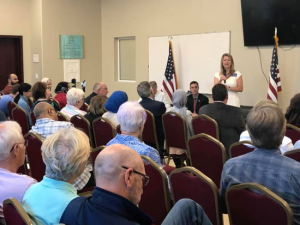 INTERIM TIME: FAN has been busy during the legislative interim: hosting our regional summits in June, sponsoring local candidate forums for upcoming elections, leading trainings with our faith community liaisons, meeting with legislators and members of Congress and their staffs, and planning for our fall cluster gatherings and our end of the year annual fundraiser in November!
INTERIM TIME: FAN has been busy during the legislative interim: hosting our regional summits in June, sponsoring local candidate forums for upcoming elections, leading trainings with our faith community liaisons, meeting with legislators and members of Congress and their staffs, and planning for our fall cluster gatherings and our end of the year annual fundraiser in November!
POLICE ACCOUNTABILITY: FAN is involved in the ongoing issue of community-police accountability. The city of Seattle is under a federal court consent decree. FAN is part of the community coalition that has been in meetings this past month with city council members, the community police commission, and a new mayor-appointed panel of modern-policing experts from around the country. The next court deadline we are working on is to come up with a methodology by which to address the current police guild contract and the accountability issues contained therein.
JOSE ROBLES: We stand in solidarity with Jose Robles, who had been living in sanctuary at Gethsemane Lutheran Church in Seattle for the past year. On July 17, he was detained by Immigration and Customs Enforcement after leaving sanctuary to file a stay of removal with his attorney. He is currently being held at the Northwest Detention Center in Tacoma, Wash. Jose has a U-Visa pending and a judicial stay in place, he should be released immediately and allowed to return home to his family. You can sign this petition demanding that ICE stop tearing Jose from his family: https://www.actionnetwork.org/petitions/freejose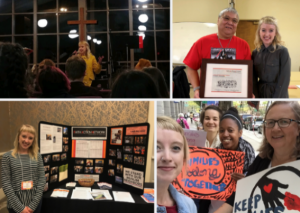

GOODBYE AND HELLO: ELCA Hunger Advocacy Fellow Sarah Vatne finished her year with Faith Action Network on July 31st. She will begin at Gonzaga University School of Law in August. We welcome Kevin Holtz who is joining FAN as a practicum intern through the Masters of Social Work program at the University of Washington. He is excited to work to end oppression with a vision of a just and free world. Welcome, Kevin!
Wisconsin
Cindy Crane, Lutheran Office for Public Policy in Wisconsin (LOPPW) loppw.org
GOOD-BYE AND THANK YOU TO KELSEY JOHNSON, LOPPW’S 2018/19 HUNGER ADVOCACY FELLOW: We have been proud to have Kelsey Johnson as a part of our full-time staff for one year. She has made connections with ELCA members, coalition partners, and legislators that have greatly benefited our ministry. We are excited for her and the church as she prepares to begin a Master of Divinity program at the Lutheran School of Theology at Chicago this fall.
IMMIGRATION: Following up on the panel discussion on immigration we held in June, LOPPW met with the Rev. Walter Baires, director for evangelical mission to explore creating a resource that includes materials from ELCA Advocacy and the LOPPW, which Kelsey is taking the lead in organizing during her last few weeks with us.
CARE FOR GOD’S CREATION:
- For our Wisconsin climate table, the director organized a breakout group on the powers of the executive office in addressing climate change utilizing an environmental attorney from Clean Wisconsin and a WISPERG (Wisconsin Public Interest Research Group) Foundation resource, Climate Solutions From Day One: 12 Ways Governors Can Lead on Climate Now.
- LOPPW joined Cassandra Carmichael of the National Religious Partnership for the Environment and local faith leaders to visit staff from the governor’s office to discuss climate change and the Endangered Species Act.
- LOPPW and the South-Central Synod of Wisconsin are leading an effort to gather information on ELCA congregations in the state that are using solar power and gather stories about how they decided to do so and resources they used. We will then create a workshop based on our findings with resources we already have on solar grants for Wisconsin churches. LOPPW will make linkages to public policy.
HUMAN TRAFFICKING:
- We are working with Women of the ELCA to organize another rally in September.
- LOPPW is working with University of Wisconsin-Madison to bring on a part-time intern who will focus on trafficking issues and assist with our rally.
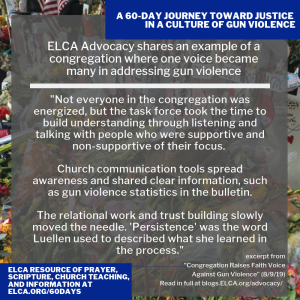


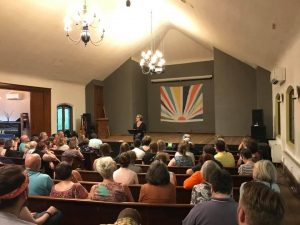
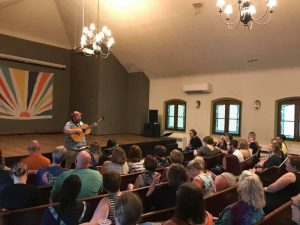 I led singing to gather us each night. One of the songs we sang each day as part of our gathering was a quote from the Sufi mystic Rumi: “Come, come whoever you are, worshipper wanderer, lover of leaving. Ours is not a caravan of despair. Though you have broken your vows a thousand times, come. Come again, come.” And in that singing we created space for everyone there, whether they sang or not, to be welcomed into this journey. We sang some paperless music, some popular songs, some requests, and some from a resource Humble Walk had recently created. Being a church poor in money, but rich in talent and volunteer spirit, they sought out used LBWs as churches switched over to ELW. Then, in order to lower barriers to participation, beautify, and simplify the hymnals, they unbound the books. They removed all but one communion service, compline, the psalms, and 50-60 hymns they would sing regularly. And finally, they rebound them in custom-made art paper to create a resource that is quirky, accessible, and matches the spirit of the place.
I led singing to gather us each night. One of the songs we sang each day as part of our gathering was a quote from the Sufi mystic Rumi: “Come, come whoever you are, worshipper wanderer, lover of leaving. Ours is not a caravan of despair. Though you have broken your vows a thousand times, come. Come again, come.” And in that singing we created space for everyone there, whether they sang or not, to be welcomed into this journey. We sang some paperless music, some popular songs, some requests, and some from a resource Humble Walk had recently created. Being a church poor in money, but rich in talent and volunteer spirit, they sought out used LBWs as churches switched over to ELW. Then, in order to lower barriers to participation, beautify, and simplify the hymnals, they unbound the books. They removed all but one communion service, compline, the psalms, and 50-60 hymns they would sing regularly. And finally, they rebound them in custom-made art paper to create a resource that is quirky, accessible, and matches the spirit of the place.